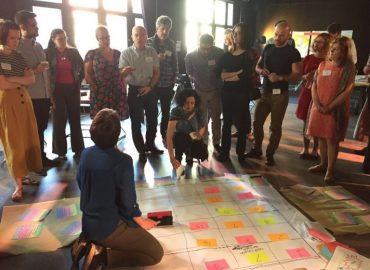Interdisciplinary collaborations and knowledge sharing are important factors to succeed in research and innovation. To promote these practices and strengthen the scientific community at the University of Žilina (UNIZA), the ERAdiate team launched in September 2018 the series of informal Scientific Cafés.
 The idea of Scientific Café was conceived in France in the Nineties by the philosopher Marc Sautet, who envisaged the “Café philosophique” as a grass-roots spontaneous forum for philosophical discussion. Since then, this form of informal gatherings has evolved and become a rather popular way to promote scientific awareness, knowledge sharing and debate. Scientific Cafés are therefore characterised by a friendly and informal atmosphere and do not necessarily take place in academic contexts.
The idea of Scientific Café was conceived in France in the Nineties by the philosopher Marc Sautet, who envisaged the “Café philosophique” as a grass-roots spontaneous forum for philosophical discussion. Since then, this form of informal gatherings has evolved and become a rather popular way to promote scientific awareness, knowledge sharing and debate. Scientific Cafés are therefore characterised by a friendly and informal atmosphere and do not necessarily take place in academic contexts.
The ERAdiate team considered the Scientific Café as a particularly suitable format to promote open knowledge sharing and an informal exchange of views on various aspects affecting participation and limiting the success of the institution in the EC Framework Programme Horizon 2020. The objective of UNIZA H2020 Scientific Cafés is to consolidate an interdisciplinary (cross-faculty) community of researchers already involved in H2020 projects and to promote knowledge sharing and collaboration among this community. This is expected to lead to the identification of common needs and requirements for the strategic development of the institution to become more competitive in H2020. On the other hand, the Scientific Cafés also aim at increasing awareness on H2020 opportunities and success stories towards brilliant researchers, especially young ones, who have clear potential, but limited knowledge and experience with European funding programmes.
The first H2020 Scientific Café focused on the general introduction of participants and the projects in which they are involved. A total of seven projects were presented: in addition to a general description of the project objectives and obtained results, the discussion focused on the sharing of the everyday experience of implementing a FP7/H2020 project at UNIZA. The discussion crossed multiple domains and highlighted both strengths and shortcomings, providing directions for institutional development.
As a result, topics to be further discussed at next H2020 Scientific Cafés clearly emerged: these include the need to define clear and common rules and procedures that satisfy both national law and EC requirements; the realisation of gender equality in science and research; the investment in researchers’ mobility and internationalisation; the need to increase institutional visibility towards international partners, which often linked to the availability and quality of web-pages and materials in the English language; the role of research project support services on legal and financial aspects, ethics and data protection, or IPRs.
In conclusion, even if the H2020 Scientific Café took place in a meeting room of the institution and not in a more informal location, participants appreciated the event format encouraging knowledge sharing and open discussion. This generated a common positive feeling of joining efforts to capitalise on the existing strengths of the institution and on acting to overcome the identified shortcomings.


